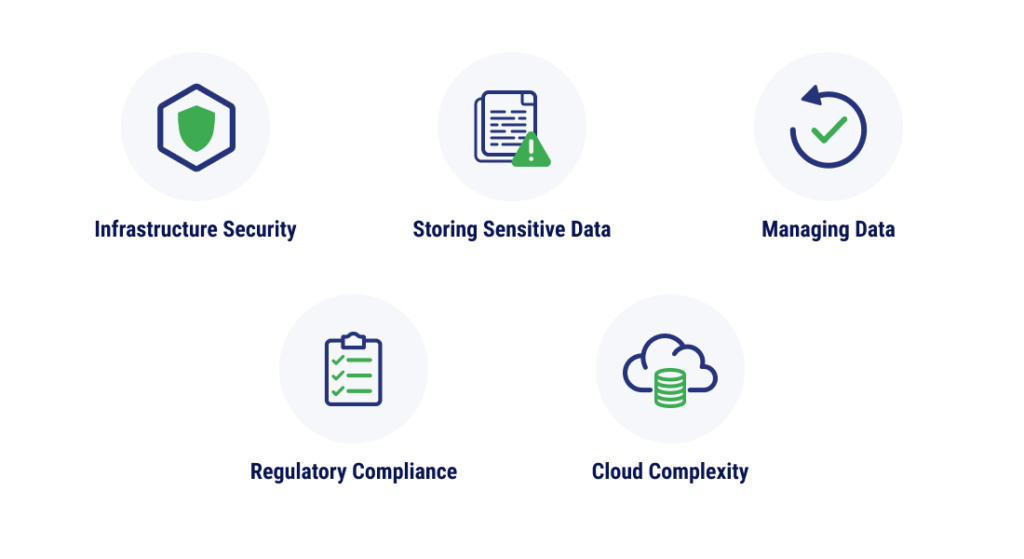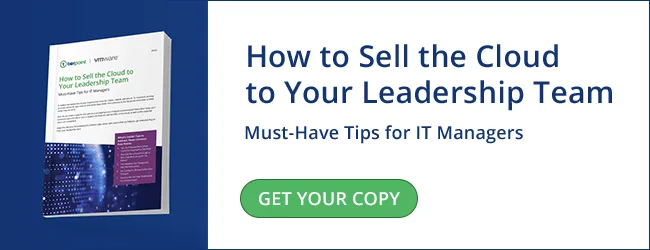
As of 2024, 89% of organizations have adopted strategies that include multiple public clouds or a hybrid cloud infrastructure. When discussing multicloud vs hybrid cloud deployments, we often focus on what’s different. However, the differences are less important than the unified goal of forming your IT strategy based on what you want to accomplish as a business.
Whether those goals are best met with one cloud, a hybrid model, or a multicloud model will depend on your unique situation, dependencies, budget, and available resources. We’ll cover the difference between multicloud and hybrid cloud so you can make an informed next step.
Public Cloud vs Private Cloud?
Hybrid environments combine public and private clouds. And in the case of hybrid IT, it can also include non-cloud environments. Generally, the choice between public and private cloud will come down to how much control businesses want over resources compared to the amount of flexibility they need.
Public cloud providers, such as AWS and Azure, rent out resources to companies in predetermined amounts at a discount, or on a model where you pay for what you use. Businesses have the flexibility to scale up or down their resources on-demand. However, they must navigate and configure the security settings and tools provided by the public cloud provider to ensure optimal security.
Private cloud can run on-premises or offsite with a data center provider. Organizations have significantly more control over configurations and security settings in a private cloud environment. However, scaling resources can be more challenging, and the infrastructure is often more expensive compared to public cloud options. This control and security, combined with the challenges of scalability and cost, make hybrid cloud solutions an attractive option for many businesses.
Multicloud vs. Hybrid Cloud: Key Differences
In cloud computing, we often hear the terms “multicloud” and hybrid cloud. While both terms sound similar, there are a few key differences organizations tend to overlook. Understanding the differences between these two cloud approaches is essential for organizations that are striving to ensure cloud optimization and meet business needs.

Architecture
A hybrid cloud is the combination of cloud and on-premises infrastructure in a unified framework. It could include public cloud (Microsoft Azure, AWS, etc.) and private cloud infrastructure. Over the past few years, hybrid cloud adoption has increased due to its many benefits, which we’ll be covering shortly.
Multicloud computing is the use of multiple public cloud platforms to support business functions. Multicloud deployments can be part of an overall hybrid cloud environment. A hybrid cloud strategy may include multiple clouds, but a multicloud strategy isn’t necessarily hybrid.
Intercloud Workloads
In a multicloud environment, workloads are deployed across different public clouds and often require additional processes and tools for interoperability. Similarly, hybrid cloud environments can include these workloads but also involve movement between cloud and on-premises infrastructures. This flexibility is often necessary for legacy systems with numerous dependencies that cannot be easily migrated to the cloud.
Vendor Lock-in
Vendor lock-in happens when a business feels overly reliant on one cloud provider and finds it difficult to switch to a new provider without significant investment and resources to do so. While both formats may introduce vendor lock-in, this may be more common in hybrid cloud environments where businesses are only using one public cloud provider. In a multicloud configuration, organizations may have more flexibility to move workloads to different public cloud environments.
Pricing
This flexibility in options within a multicloud environment can lead to more competitive pricing for businesses. Public cloud resources can be purchased in discounted packages for predictable workloads, while pay-as-you-go pricing is available for variable workloads.
Availability
With hybrid cloud, availability depends on both the public cloud provider and the on-premises infrastructure in use. In contrast, a multicloud environment can offer higher availability since data and workloads are distributed across multiple public clouds, reducing the risk of downtime.
Data Storage
Data storage has some similarities and differences between cloud environments. In hybrid cloud storage, on-premises storage (private cloud) is combined with public cloud resources. This provides greater control for sensitive data stored on the private cloud, but also requires tools to move data between environments that may be harder to set up compared to multicloud environments. Hybrid cloud can be ideal for businesses that have a mix of sensitive and non-sensitive data, and for those that want greater control over their core infrastructure.
With multicloud storage, data is stored across public cloud providers, which offers greater flexibility and scalability. Although multicloud storage can also be complex to manage, it reduces the risk of vendor lock-in by providing businesses the option to choose between different public cloud providers based on their specific needs and cost considerations. Multicloud is well-suited for businesses that want more scalability and flexibility, and don’t have as many data residency regulation concerns.
Security
In comparing multicloud and hybrid cloud environments, security plays a crucial role. Hybrid cloud setups allow organizations to implement tailored security measures across both public and on-premises infrastructures, providing greater control over sensitive data. In contrast, multicloud environments, which rely on multiple public cloud providers, often have less room for customization. While this can present challenges for specific compliance needs, many public cloud providers still meet essential standards such as GDPR and HIPAA. Ultimately, the choice between the two depends on an organization’s specific security requirements and regulatory obligations.
Flexibility
In terms of flexibility, hybrid cloud environments offer organizations the ability to seamlessly integrate on-premises and public cloud resources. This allows businesses to choose where to host specific workloads based on factors like cost, performance, and compliance. On the other hand, multicloud environments provide flexibility through the use of multiple public cloud providers, enabling organizations to select the best services from each provider.
While both approaches enhance adaptability, hybrid clouds excel in integrating legacy systems, whereas multicloud setups offer diverse options and avoid vendor lock-in, allowing businesses to respond more dynamically to changing needs.
How is Hybrid Cloud Similar to Multicloud?
Despite these differences, hybrid cloud and multicloud share many similarities. They can both be solid frameworks to store sensitive data when configured well, but they can come with common challenges, such as cloud complexity.

Infrastructure Security
Both hybrid and multicloud environments operate on a shared responsibility model as one strategy to mitigate risks. With a shared responsibility model the level of infrastructure security responsibility may vary. Cloud providers are responsible for securing the underlying infrastructure, while customers must secure their applications, data, and access controls within that infrastructure.
Key responsibilities for businesses include identity and access management (IAM), data encryption, and vulnerability management. Users should have access only to the resources necessary for their roles, whether in public or private clouds. Data must be protected both at rest and in transit, so organizations need to implement proper encryption measures. Regularly scanning for vulnerabilities and applying patches is essential to mitigate risks associated with security weaknesses, including zero-day attacks. By actively managing these responsibilities, organizations can enhance their overall security posture in any cloud environment.
Storing Sensitive Data
Even though public cloud providers offer fewer security customizations for businesses, both hybrid and multicloud environments can be suitable for storing sensitive data. Hybrid cloud gives organizations the power to place their most sensitive information on private infrastructure, whereas multicloud infrastructure allows for redundancy across multiple public cloud providers, mitigating risks from outages and data breaches.
Managing Data
In both multicloud and hybrid cloud, businesses must determine how to manage data across different platforms without compromising accessibility and performance or causing excessive data fragmentation. Hybrid clouds require tools and processes to facilitate data movement between public and private environments. While multicloud setups can simplify data management by leveraging multiple public clouds, they may still necessitate additional configuration to ensure effective data movement between those clouds.
Regulatory Compliance
Different businesses and industries are subject to different regulatory requirements, such as HIPAA, GDPR, CCPA, and PCI-DSS. Most public cloud providers are certified to meet common compliance standards, but if you have very specific needs, you may need to talk with the provider to confirm they can meet your compliance capabilities. Hybrid cloud offers more control over regulatory compliance, allowing businesses to store sensitive data on-premises or in an offsite private cloud.
Cloud Complexity
Cloud complexity is an issue for hybrid and multicloud environments, but what is being managed is where the difference resides. Hybrid cloud involves managing public and private cloud infrastructure. Multicloud involves managing different public cloud provider platforms, APIs, and security settings.
Can a Hybrid Cloud be a Multicloud?
A hybrid cloud can incorporate multicloud elements if it includes multiple cloud environments, such as a combination of public and private clouds. However, multicloud specifically refers to the use of multiple public cloud services from different providers, so it is not accurate to consider all multiclouds as hybrid clouds. While a hybrid cloud may include public clouds, it is distinguished by the integration of on-premises or private cloud resources.
Why Do Companies Use Multicloud?
Companies use multicloud to escape vendor lock-in and improve flexibility and performance across cloud environments. This isn’t a great fit for companies that have legacy frameworks they can’t easily move to the cloud. However, for businesses looking to innovate, multicloud can be a great option.
Why Do Companies Use Hybrid Cloud?
Companies tend to use hybrid cloud when they are either not completely ready to move all of their workloads to the cloud, or when moving some workloads would require more effort than it is worth, but they still want to leverage the benefits of the cloud. Hybrid cloud can serve as a happy medium or a long-term solution for digital transformation in a company, allowing for more innovation and flexibility compared to on-premises frameworks.
How to Choose a Cloud Strategy That’s Right for You?
Choosing between hybrid cloud and multicloud hinges on your unique business needs. Data sensitivity, scalability, compliance requirements, and budgetary limitations will determine the optimal solution. Need guidance in figuring out what configuration will work best for you? TierPoint’s cloud experts can help you choose the right mix of cloud platforms that will help you reach and exceed your digital transformation goals while keeping your financial constraints and regulatory requirements in mind.
Part of adopting the cloud is convincing your leadership that it’s time to modernize your IT infrastructure. The drivers could be network performance, on-premises data center costs, and more. Read our complimentary eBook to learn how to have those conversations.

